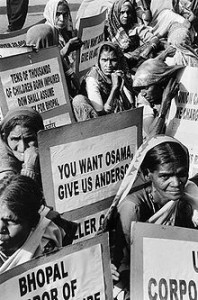| New Delhi, March 7: The Centre has made Aadhaar essential for the 1984 Bhopal gas tragedy compensation, undaunted by the uproar over making the IDs mandatory for school mid-day meals. All those entitled to the Bhopal cash aid will have to provide Aadhaar or enrol for one by June 30 to continue getting the assistance, according to a notification issued by the Union ministry for chemicals and fertilisers yesterday. The compensation is paid for “death, permanent disability, injury of utmost severity, cancer, total renal failure and temporary disability” suffered by the gas victims. The process of providing the assistance continues even 32 years after the tragedy because of a long legal battle with Union Carbide, which owned the plant from where the toxic fumes leaked in December 1984, over damages. On the midday meal, however, there were indications the HRD ministry may extend the June 30 deadline for furnishing Aadhaar or proof of having applied for one. The ministry may take up the matter with the PMO after realising the target is unrealistic. ×  According to the National University of Educational Planning and Administration (NUEPA), which collects information on enrolments, nearly 2.5 crore children have so far provided Aadhaar details. But given that nearly 10.5 crore schoolchildren in government schools have the meals, that still leaves a huge number out of the Aadhaar net. Faced with protests, the Centre today said no child would be deprived of the meals and those without Aadhaar can use alternative IDs. The BJP circulated the statement. Upset with the spate of orders making Aadhaar mandatory for a host of services – including scholarships and the maternity benefit scheme – women activists have started protests and described the diktats as an “effort to dilute hard-won legal entitlements”. Curiously, Aadhaar has brought transparency and accountability activists on the same platform as those sceptical of giving every citizen a unique identity. Aadhaar sceptic and researcher Usha Ramanathan said the government’s claim of the Unique Identification Authority of India (UIDAI) – which issues Aadhaar cards – being the remedy for all corruption was negated by the fact that those who fought for the Right to Information Act were opposed to it. “The UID (unique ID) inverts the idea of transparency. It makes people transparent but the state opaque.” “First, they said the poor would be given an identity. Then it became that you will not get your entitlement if you don’t have this number. What we are seeing today is rampant and shameless illegality by the State as the Supreme Court has clearly said Aadhaar should not be made mandatory. Even in six areas, including PDS, MNREGA, Jan Dhan and LPG where the court has allowed Aadhaar, it has said this should be voluntary,” Ramanathan said. RTI activist Anjali Bhardwaj dubbed “fallacious” the Centre’s contention that Aadhaar would end corruption. Another activist, Amrita Johri, pointed to an audit of 42 PDS outlets in Delhi and said Aadhaar biometrics did not work most of the time, as a result of which many were denied their monthly ration. “If biometrics do not work properly in Delhi, imagine what the situation must be like in other places where (Net) connectivity is worse,” Johri said, adding the Aadhaar rule was leading to exclusion. “When the biometrics do not work, the default setting on the records is that people did not come to the PDS shops.” Magsaysay winner Bezwada Wilson, among the petitioners in the Supreme Court case against Aadhaar, flagged a problem faced by vulnerable groups.”Some of us, born into families involved in scavenging, may want to bury our identity but society does not allow us that. Now Aadhaar is further institutionalising it. It is an obstacle to our bid to come out of our identity. https://www.telegraphindia.com/1170308/jsp/nation/story_139609.jsp#.WMIzfTuGM2y |
March 11, 2017 at 9:32 pm
The aadhar has been made mandatory for even Bhopal gas relief is a negative step which may affect the needy oeople .
March 11, 2017 at 9:37 pm
Many needy persons may be left out of the financial assistance due to the this order. The government making aadhar mandatory may affect the persons who need the assistance